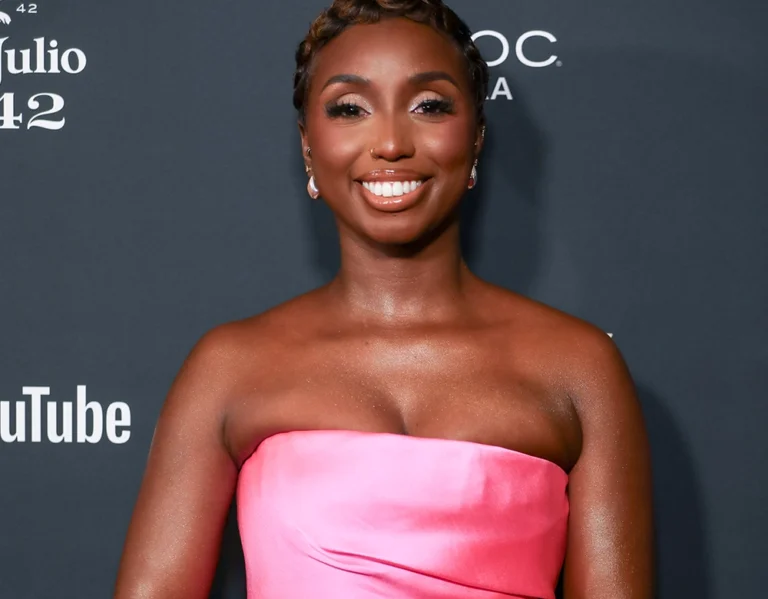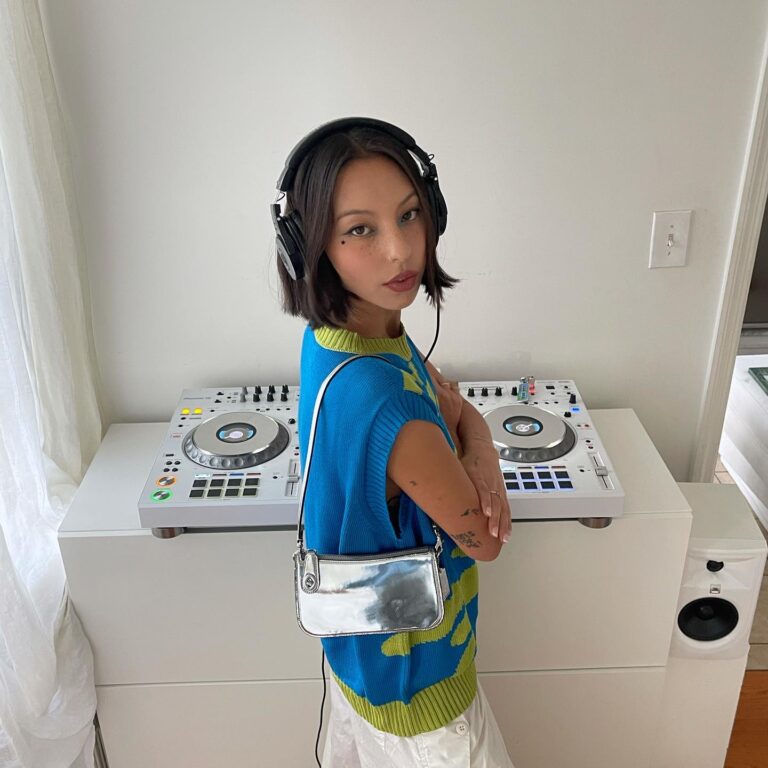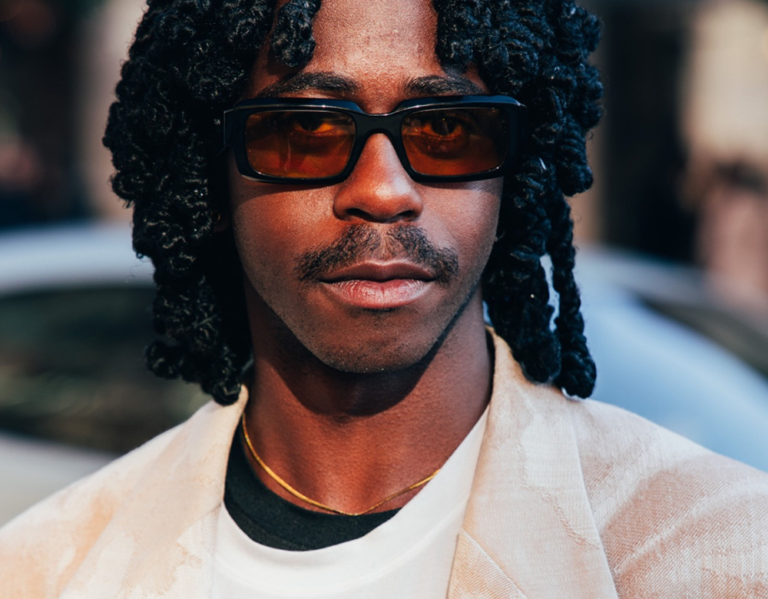Isaac Andrews, Painter, London
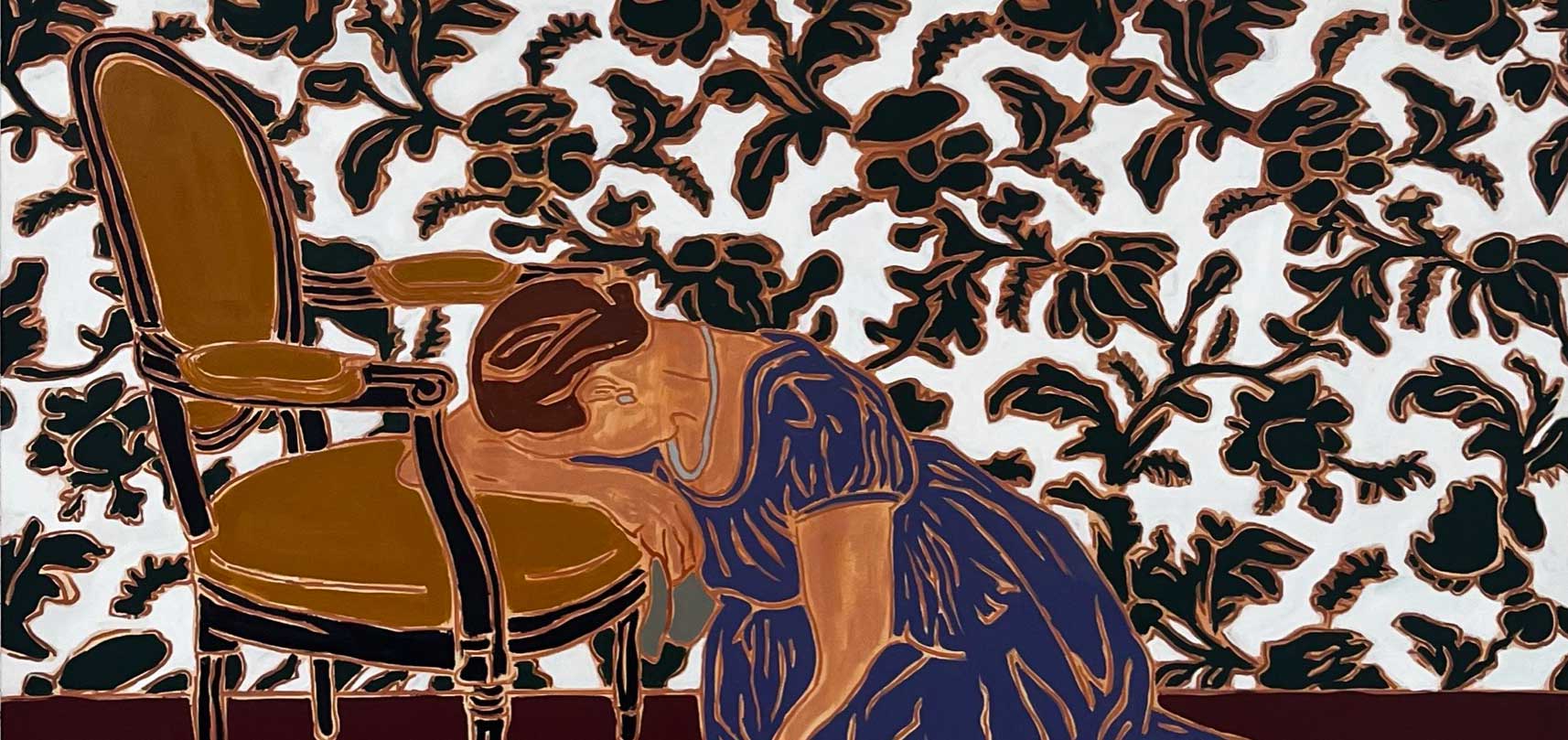
Hi, would you like to introduce yourself?
Hi, I’m Isaac, I’m 20 years old and I’m a painter.
How would you describe what you do?
I was thinking, what does [this question] actually mean? I was thinking, I just paint! Not much else to it really.
What does the average day look like for Isaac Andrews?
The day-to-day is at the studio, pretty much all day. Most of the time I’ll be painting, but also doing everything that comes alongside that. So looking at emails, stretching canvases, mixing paints, whatever. Most of my hours spent in the studio are just painting or drawing or sketching, prepping for the next piece or finishing a piece. It’s quite boring, really.
Do you tend to want to switch it up or do you like the routine of doing the same thing every day?
For me, this routine has been my routine for the past 3 years. Every day that I can go to the studio, I go. It doesn’t really feel like I’m going to work. It doesn’t feel like, ugh I’ve got to get up and go to work, it’s just become the normal day-to-day. It doesn’t feel like anything but the norm to me. I wouldn’t have it any other way because if I don’t go to the studio, if I don’t paint for the day, I start to get annoyed. I start thinking about the next time I’ll be able to go. I love doing it. It’s my favourite thing in the world and it’s almost like I need to do it. I see it as, “Why would I not be here?”
Where would you say your love of art has come from? Or has it been something that you’ve always loved?
I don’t know actually! I mean, ever since I was young I was making things, drawing or building something, always creating something. I always wanted to be something creative. I used to come home from school and not do my homework and just make art until I had to go to sleep. Then I’d wake up, go to school, come back, and do the same thing. As I started to fall in love with the act of actually doing it, I sort of wanted to look into it more and learn more. I’ve always loved looking at art and going to galleries and seeing art in person, but then it became not just “I’m going to see an exhibition” but more of “I’m going to learn now. I’m going to take from this artist and go and learn from [this other] artist”. Once that clicked in my brain it just hasn’t really stopped. It’s fascinating, I wonder where it all came from.
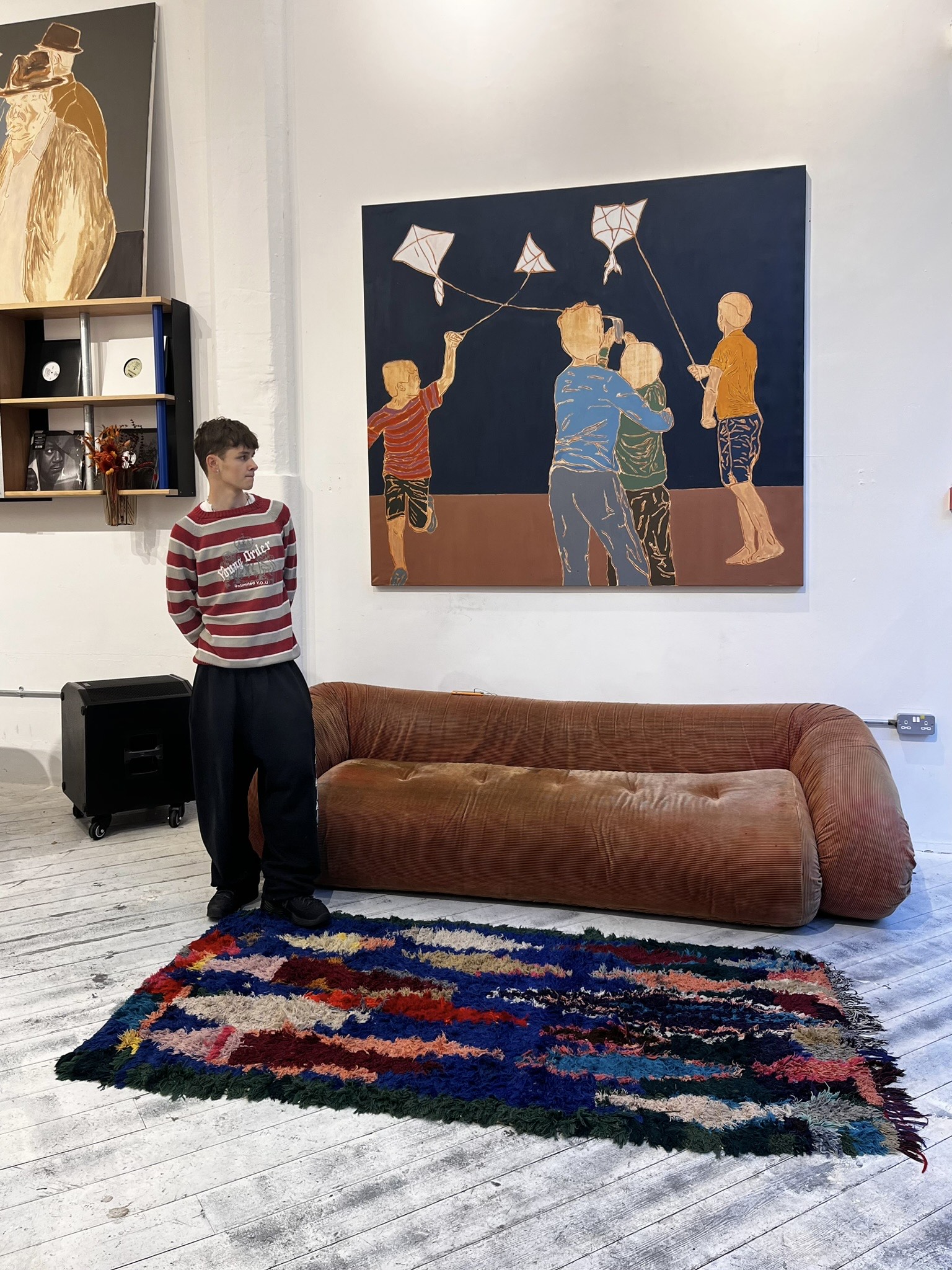

You were previously a child actor, so I would assume that would have taken up a lot of time, or at least a big portion of your developmental years. I was wondering, where did that love of acting come from? Whilst they’re both creative fields, it does feel like such a big jump. At what point did you realise that you wanted to pursue art?
I really, really loved acting. I think most people thought that it was maybe my parents who made me do it but it was the opposite. I got quite a bit of success at quite a young age but then I sort of fell out of love with it. I don’t know… I saw an actor as a sort of pawn in the director’s plan. I didn’t want to be the vehicle for someone else’s creativity. I wanted it to be my idea, me behind the camera, which I guess I can do through making paintings. I mean, it’s always been a plan to make films in the future, and to be honest I would be very happy to go back into acting but right now, whilst I have the passion to be in the studio every day, I want to keep doing that.
Back to the question about where it came from… I guess what made me a good actor at a young age, my mum and dad have always said this, is that I was very perceptive growing up. I had the ability to put myself in a position that was very different to mine, and I guess that’s kind of a similar mentality to where I’m at with my paintings. Instead of playing a person, I’m painting them. I’m still telling stories.
"It comes down to awareness of the self and of others.... it's always been about the human psyche and the role of the individual, the human experience."
I see your paintings now as almost being movie stills. I was going to ask if you think your film background has influenced your artwork, but you’ve essentially answered that question! I was wondering if there’s anything else? Is there an interconnecting theme that’s apparent in your work as well, that you feel carries throughout, even in your artistic development?
Hmmm… yeah, I guess. Even before I started painting people, back when I was doing my collages, my mixed-media work, and video work, it was always – and I hate the term, but for a lack of a better word – social commentary work. I never really liked that label, but it kinda was that. I was a young and naïve kid looking around at the world thinking, What do I think about this? What do I believe about this? Is this stuff right or wrong? Where do I sort of stand, and how can I talk about this stuff? I had a lot to say, and art felt like the best way to say it. Now it’s still the same thing, but it’s entirely focused on figures and these imagined scenes and imagined people. It comes down to awareness of the self and of others. It’s an all encompassing awareness. It comes down to empathy too. The paintings, at least in my mind, talk to a lot more than just a picture of a person. I think it’s always been about the human psyche and the role of the individual, the human experience. That’s what these paintings are and have been for the last year and a half. They look to these sort of shared, collective experiences as a way of bringing us together. And shared emotions. That’s the access point of bringing us all together, at least in my eyes.
Do you think professional training or art school is important in order to become a successful artist?
I mean, it’s hard to say because I haven’t gone through the whole process of art school yet. I think you can have success without it but education is important in the art world, not in terms of traditional education in an institutional sense, but I also think you have to learn a lot and be aware of the world you’re putting yourself in. Knowing as much as you can and continuing to learn as much as you can is the one thing that will take you far. At the end of the day, art is an academic subject which people do study academically. There’s lots of history and theory that you do have to be aware of, but you don’t need to go to an institution to do that, you can learn that yourself. A lot of the stuff I’ve learnt that has helped me the most has been from YouTube, not from a teacher. I think there’s also a lot of issues with art institutions as a whole, like the idea of charging students that amount of money for a degree that doesn’t have a lot of direct jobs from it. When galleries are saying, “you can’t come to us without a Masters”, I think that ostracises a whole demographic of people. It’s not feasible for everyone, so I don’t think it needs to be a requirement. Again, this is all my own opinion.
As you pointed out, there are a lot of disparities in terms of access to creative industries. Last year you curated an exhibition called Collectivist, funded by Converse. How important are exhibitions like this in terms of platforming marginalised creatives?
I wanted to bring artists together and bring each other up, instead of being pitted against each other. I think they’ll never not be important. I was so thankful to Converse for letting me put that on, because bringing together that amount of talent and the range of backgrounds was really beautiful. Everyone in that room was an equal. In the future I want to have my own gallery which would be founded on the principles of that show. There was enough range and diversity in that room that anyone could have found something that they liked. The ability to share each and use each other’s platforms was really important too, someone may have come to see 1 artist and was exposed to 14 more. It’s something I want to keep doing as well, because the art world is incredibly backwards and elitist but it’s going in the right direction. It’s important to keep going.
"A lot of the stuff I've learnt that has helped me the most has been from YouTube, not from a teacher."
What do you enjoy most about your job?
The time that I get to spend with my paintings and with myself. The time for introspection and the time for clarity of thought. Everything can be so fast paced and distracting that being able to sit and do something that is cathartic and ultimately a meditative process, being able to sit with yourself and think, that’s the thing that I’m luckiest for. Also, creative freedom! Not relying on anyone else, no middle man. It’s just me, I have the final say. I wouldn’t have it any other way.
What challenges do you face in your work?
I think when I was making the work for the audience. Not for me. I was envisioning who would be perceiving it and catering it to that, which is the entirely wrong way to go about it. The works… they didn’t feel… Well, they weren’t very good, basically. It was the wrong intention behind it, it was done to appease someone else’s perspective. I was in the mindset of others thinking, “this will do really well on instagram” or “people will really like this one”, and even though a lot of them did, quite quickly after that I didn’t know what to make anymore. “Authenticity” kept ringing in my head. So, the lesson I had to teach myself: making it for you. Not for what you think is going to sell, or do well or get you more jobs or whatever. You need to be there for the process, making the painting for yourself and not for anyone else. I’ve been happiest with the work when I’ve been doing it for myself, but it’s something you can lose touch with.
"“Authenticity” kept ringing in my head. Not for what you think is going to sell, or do well or get you more jobs or whatever."
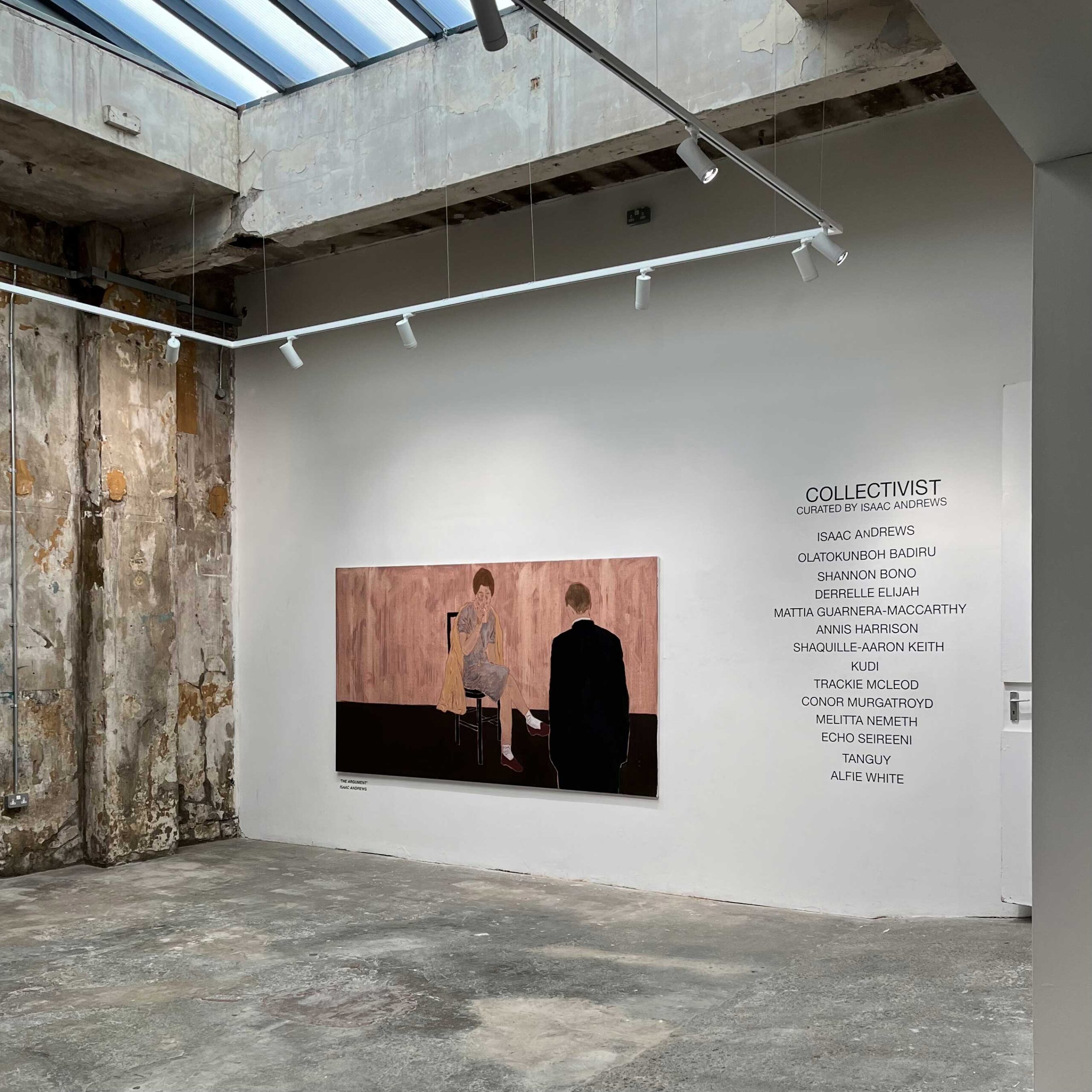
I guess on a societal level, the second that external influences or money becomes a motivator, it deeply interferes with the essence of being creative. It suddenly becomes unenjoyable, which always gives me an existential crisis.
Exactly. It’s like as soon as money gets involved, you lose a lot of objectivity and you can’t see it clearly because you’re like, “I’ll keep doing paintings like that, so I can keep selling them.” Sometimes I make 10 paintings which I end up scrapping because I’d rather take the time and be happy with them. It takes a lot of critical faculty. That skill is so important because that’s what’s going to define you and separate you from anyone else.
What advice do you have for aspiring artists and other young people who are interested in pursuing art?
One thing I’ve always said is: do the work. Because no one is going to tell you to do the work. And when you’re doing something that’s decided by you and you’re the driving force behind it, you have to put in the work otherwise you’ve got nothing to stand on. If you’re saying “I want to be the most amazing artist this person’s ever seen”… Ok, so where’s the work? You have to have something to back it up. Other than that, I would say learning, learning as much as you possibly can. That’s one thing that will actually separate you.
When I say learning, I mean every aspect of it. Seeing art in person, reading books, reading theory, watching talks with artists and art critics. If you really want to do it and do it right, you have to approach it as a lifelong devotion to it. Not just, “I’ll do this for a week and make a painting and make loads of money.” No one should have that intention going into it. Advice-wise, I don’t think I’m the best person to give advice because I am still young but doing the work, but unashamedly selling yourself and being proud of your work are the most important things you can do.
"One thing I’ve always said is: do the work. Because no one is going to tell you to do the work. And when you’re doing something that’s decided by you and you’re the driving force behind it, you have to put in the work otherwise you’ve got nothing to stand on."
LATEST THAT MAY INTEREST YOU


